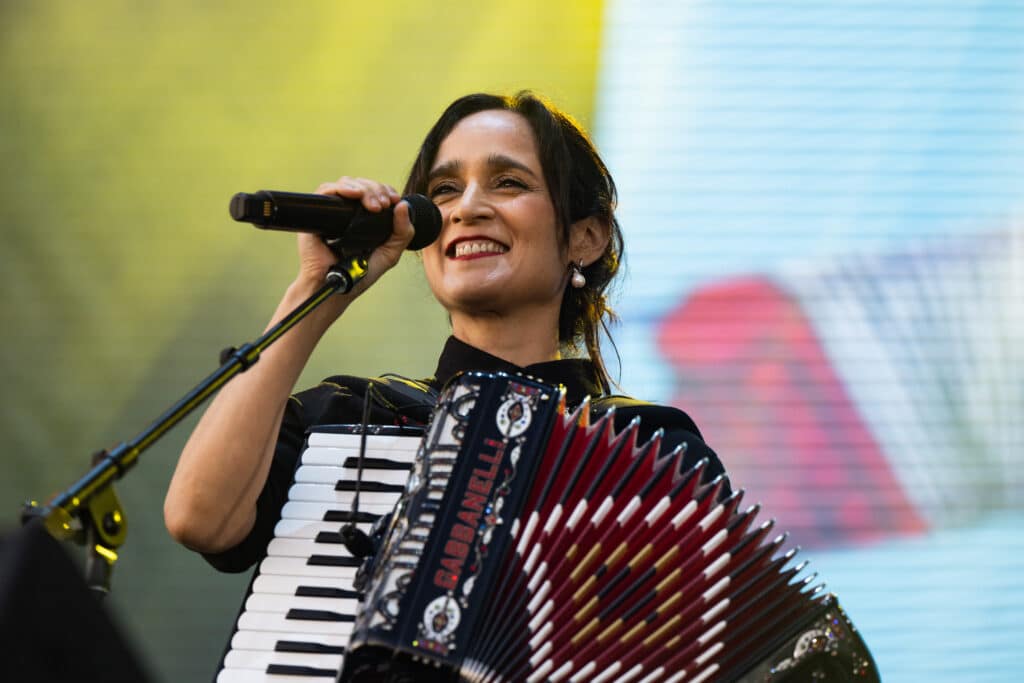Features
Bésame Mucho Festival Hits the Right Notes (Live Review)

(Photo by Scott Dudelson/Getty Images)
As a Los Angeles native, one can’t help but have countless memories at Dodger Stadium watching the Boys in Blue, but after Bésame Mucho, I now have something in the memory bank from Chavez Ravine that doesn’t involve baseball.
The inaugural one-day music festival presented by Live Nation on Dec. 3 was quite the sight with 58 (!) Latin music acts performing across four stages throughout the stadium parking lot. It was — for lack of a better word — mucho (a lot) in every way with tens of thousands of fans, too many artists, long lines and lengthy walks from stage to stage. Despite feeling overwhelmed, I couldn’t help but be swept away by the celebration of Latin culture, its history and the music that’s carried on for decades, proving that nostalgia is a powerful drug.
I made it a point to walk through the entire setup, which included food from local vendors and Dia de Los Muertos-inspired art and photo ops, and take in the scenery. It was a surreal moment visiting each stage — as if I revisited several chapters of my life in a matter of 20 minutes.
Starting on the east side of the lot at the pop stage, I was transported to my hipster youth days with catchy synthpop bliss from the 90s Mexican band Moenia. I then trekked to the nearby Beso stage where I was overcome with nostalgia and emotion by the sounds of Los Terrícolas, a Venezuelan pop group from the 70s whose ballads made the cut on a few of my father’s mix tapes, of which there were hundreds.
The next stop was the Clasicas stage, where the most diverse group of fans was located with teens standing alongside their parents to watch Ramon Ayala, the Mexican king of the accordion, and Los Bravos del Norte. I managed to catch them performing the 1985 hit “Rinconcito en el Cielo,” a Norteño classic that is certainly on the playlist when the cousins and I start to enjoy a bottle of tequila.

(Photo by Scott Dudelson/Getty Images)
Minutes later, further into the nostalgia hole I went and found myself near the rock stage to watch a brief, emotional set from Enanitos Verdes. The popular rock en español band played for the first time without lead singer and songwriter Marciano Cantero, who died on Sept. 8 at the age of 62. Guitarist Felipe Staiti took over frontman duties and admitted to the crowd that the night was “the most difficult of my life” and that the band was “wounded, but alive” and ready to celebrate the music Cantero left behind. He wasn’t alone in doing so and was accompanied by fellow rockers David Summers of Hombres G and Rubén Albarrán of Café Tacvba for a few songs.
That moment underscored what the event was all about: Coming together and celebrating life and the diverse Latin culture and music, which knows no boundaries when it comes to genre and age. Albarrán, who rejuvenated the evening crowd with his infectious energy on stage, often commended the organizers for uniting so many different artists and said he looked forward to future iterations of the festival, sentiments that I agree with.
While Bésame Mucho turned out to be one of the most festive environments I’ve ever experienced in L.A., it wasn’t without its hiccups. Some artists had technical difficulties and the audio was inconsistent. Though variety is appreciated, less would have been more for such a grand event as fans were forced to make difficult decisions throughout the day on which artists to see. Many seemed to have made the same choice, which resulted in some areas (mainly the rock stage) being overcrowded and difficult to navigate.
No festival is going to get it all right on the first attempt, but it was a valiant and successful effort from all parties involved. Tickets sold out in minutes when they went on sale 10 months ago, making it likely that a 2023 edition of the festival is in the works. If that is the case, then I look forward to taking another trip down memory lane next winter (with more comfortable shoes), and hopefully, it will highlight other Latin music genres.